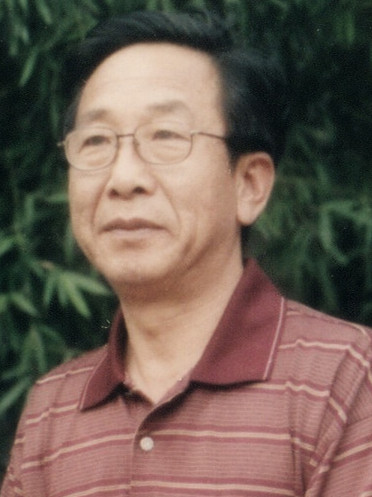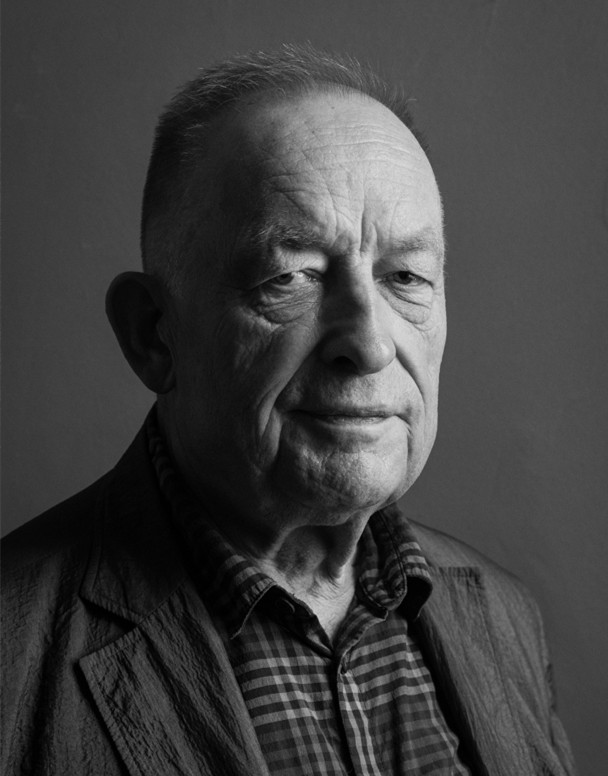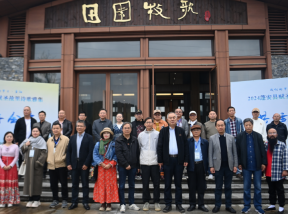本帖最后由 杨宗泽 于 2025-5-24 17:06 编辑
- 科恩里尤斯诗选(二)
-
- 杨宗泽 编译
-
- Selected Poems of Kornelijus(Set Two)
Compiledand translated by Yang Zongze 圣杰罗姆的辩护词
狮子与头骨。太阳与黄沙。 那些不必要的东西从意识中离去,蒸发、渗透 进入安条克荒漠,肉体干涸,灵魂澄澈, 心智变得敏锐,坚硬的微粒沉淀在文字之中,等待 其他的眼睛,它们的光芒与生机转化为新的 意象、意义与感知。四十天后, 摩西带着石版从西奈山下来。 那些跟着蛇旗穿越沙漠的人们 让亚伦用耳环和项链 为他们铸造一个上帝的形象, 于是他铸了一头金牛,这在这些国度里 牛是古老而常见的象征,牛角之间有一个太阳圆盘, 在迷雾笼罩的未来,它曾载着欧罗巴漂向克里特岛, 也许此刻它正温顺地立在马槽旁…… (不,我们在此不会提及帕西淮,也不会提及铮铮作响的青铜。) 正因为如此,圣杰罗姆给摩西画上了角,仿佛在邀请 我们走向一种舒适安宁的定居文明,走向民法, 走向橄榄树和葡萄藤繁茂的清凉。但事实并非如此, 他用他的律法石版打破了这一象征,而这些石版—— 这一象征——将不得不重回山中。 和平不会到来,鲜血还将流淌数千年。 沉醉于鲜血与黄金,让我们传播未知的知识吧。 众神会像鹿一样蜕下它们的角,然后又重新长出,就如同我们 这些过客,需要为了那应许的永恒舍弃我们短暂的生命。 假先知们会诚实地向我们解释一切。 而我们这些译者,仍会继续犯错。 在大教堂的壁龛里,摩西头上的角又一次长了出来。 写于2020年8月
*圣杰罗姆是西方早期教会的教父之一,生活在公元4世纪至5世纪。圣杰罗姆以其对《圣经》的翻译工作而闻名,他将希伯来文和希腊文的《圣经》翻译成拉丁文,即通俗拉丁文本圣经,这一译本在中世纪的欧洲教会被广泛使用,对基督教的传播和发展产生了深远影响。此外,他博学多才,精通多种语言,在神学、文学等领域也有诸多著作和贡献,对当时及后世的宗教思想和学术研究都起到了重要的推动作用。——译者注。 *安条克荒漠指的是位于古代叙利亚地区安条克附近的一片荒漠区域。安条克是历史上重要的城市,在不同时期为塞琉古帝国、罗马帝国的重要据点。——译者注。 * 西奈山通常指位于西奈半岛南部的一座山,在犹太教、基督教和伊斯兰教等宗教中具有极其重要的地位。在《圣经》故事里,上帝在西奈山向摩西显现,并赐给他十诫。西奈山是宗教信徒心目中的圣地。——译者注。 *帕西淮 在希腊神话中,她是克里特岛国王米诺斯的妻子。帕西淮因爱神阿佛洛狄忒的诅咒,爱上了一头公牛,最终生下了半人半牛的怪物弥诺陶洛斯。——译者注。 St. Jerome'sApologia
The lion and theskull. Sun and sand.
What is unnecessary leaves consciousness, evaporates, seeps
into the desert of Antioch, the bodydries, the soul clarifies,
the mind sharpens, and hard particles settle in letters waiting for other eyes,their light and life, to turn into new images,
meanings, perceptions. Forty days later,
Moses comes down from Sinai with tablets of stone.
People who went through the desert following a snake-flag
asked Aaron to cast for them an image of God from earringsand necklaces,
and he cast a golden bull, the old, normal symbol
in these countries, with a sun disk between its horns,
who floated Europa to Crete in the foggyfuture
perhaps standing meekly by the manger…
(No, we will not mentionPasiphaë here or the sonorous copper.)
That's why Jerome givesMoses horns as if inviting
us to a cozy and peaceful settled civilization, to civil law,
the cool density of olive trees and vines. But no,
he breaks the symbol with the blocks of his law, the blocks –
into the symbol – will have to return to the mountain.
There will be no peace, blood will flow for millennia.
Drunk from him and gold, let us spread knowledge, what we do notknow. Gods will shedtheir horns like deer and grow them again, as we,
passers-by, will need to give up our short lives for promised eternity. False prophets will explain everything to us honestly.
And we will continue to make translation mistakes, foremen.
In the niche of the cathedral, Moses again with sprouting horns. August,2020
螳螂
诗歌的真谛是一桩令人非议之事。一千对赤身裸体交媾的情侣 连同他们的呻吟和扭曲之态与一个精妙的隐喻相比,都不值一提。 ——查尔斯·西米克
你再也没有时间去哀伤地歌唱了——她说, 那个做事欠思量又善变的女人??—— 是时候让你按照你随意对待 这世界的倒影所招来的后果,变成一只甲虫了, 尽管你曾认为这世界的倒影是存在的, 你让自己变得渺小、隐匿、满心怀疑, 将宣泄与高潮、狂喜混为一谈…… 好吧—— 我说—— 我会变成一只螳螂, 一个修道院苗圃和花园的热忱的访客, 在昆虫的食物链中占据 同样的社会地位。 至少变成一只雌性螳螂或是大象的脚…… 没人能逃脱变化。我已故的父亲, 他总是试图保护我 免受那个做事欠思量又善变的女人的伤害, 从梦的帷幔之后发问:你还会写 你最欢快的诗句吗?我觉得很奇怪: 一个那般严肃的人,读着那些淫秽之词, 却又把那个放荡不羁之人 推向隐喻的泥潭。
写于2019年8月
*查尔斯•西米克(又译查尔斯·西米奇)是一位著名美籍塞尔维亚诗人、散文家和翻译家。1938 年出生于塞尔维亚,1954 年移民美国。他的诗歌风格独特,常以简洁而富有想象力的语言,将日常事物与超现实元素相结合,探索生命、记忆、时间和存在等主题,曾获得过普利策诗歌奖等诸多重要文学奖项,在当代诗歌领域有着重要地位。——译者注。 Praying Mantis
The truth of poetry is a scandal. A thousand naked fornicating couples
with their moans and contortions are nothing compared to a goodmetaphor
CharlesSimic You no longer havethe time to sing sadly – she said, the woman, whomakes, then considers, the spinner --
time for you to turn into a beetle according to the consequences that yousummoned by so casually treating the reflectionsof the world, though you considered that it exists,
made yourself insignificant, hidden, self-doubting,
confusing catharses with orgasms, ecstasies ...
All right – I said – I'll become a praying mantis,
a zealous visitor of monasterynurseries and gardens,taking on the same social status
in the food chain of insects.
At least a female or an elephant's foot… No one escapeschange. My dead father,
who always tried to protect me
from a woman-spinner who makes, then reconsiders,
asks from behind the cloak of a dream: will you still write
your happiest verses? I find it strange:
such a serious man, reading those obscenities,
yet pushing the libertine
into the mire of metaphors. August,2019 七月。花道。
酷热的日子 终于结束。有时会下点雨。 一个念头如同水塘里的小船, 朝着我的方向漂来,却又擦肩而过。 我紧紧咬住夏日的咽喉, 牙齿因浆果或美酒而泛蓝…… 柽柳、泛黄的萱草, 荷叶、泛红的睡莲, 黄栌。小船已抵达 岸边。你却不在船上, 你在那束花的记忆里。 写于2015年7月
July. Ikebana.
The hot days at last have ended. It rains sometimes. A thought like a boat in a puddle, carried my way but drifting past. I cling to summer’s throat with teeth blue with berries or wine… Tamarisk, yellowed daylily, lotus leaf, reddish water lily, smoke tree. The boat has reached the shore. You are not in it. You are in the bouquet’s memory. July,2015 file:///C:/Users/ADMINI~1/AppData/Local/Temp/msohtml1/01/clip_image002.jpg
【作者简介】科恩里尤斯•普莱特里斯 立陶宛当代著名诗人、散文家、文学批评家和诗歌翻译家,通晓英语、俄语、波兰语等四国文字。普莱特里斯1951年1月出生于立陶宛的希奥利艾,现为立陶宛艺术家协会主席。自1977年至今已有诗集《词语与日子》、《桥上的家》、《风之陷阱》、《对着一条河的演讲》、《潮标》、《万能面具》和散文集《住在尼曼河边》、《我们在流逝》、等十多种著作在国内外出版,另有大量诗歌翻译作品在国内外报刊发表或结集出版,曾翻译出版过艾略特、庞德以及波兰当代著名诗人切斯瓦夫·米沃什(1980年诺贝尔文学奖得主)、爱尔兰当代著名诗人谢默斯· 希尼(1995年诺贝尔文学奖得主)等人的作品。科恩里尤斯曾于2002年荣获立陶宛国家文化艺术奖。 [About the Author] Kornelijus Platelis a well-known Lithuanian poet, writer,literary critic and poetry translator, born in Jan.1951 in Šiauliai, Lithuania, he currently serves aspresident of the Lithuanian Association of Artists. Since 1977 he has publishedover ten selections of poetry and prose such as Words and Days, Home on theBridge, Snare for the Wind, Orations to the River, Tidemark, Dwelling byNemunas, And We Are Passing, ALTERNATING MASKSand so on. Besides Lithuanian,Kornelijus has a good command of English, Russian and Polish andhas translated many poets’ works including great Eliot, great Pound, CzesławMiłosz (an outstanding Polish poet, the winner of Nobel Prize in literature1980) and Seamus Heaney (an outstanding Ireland poet, the winner of Nobel Prizein literature 1995) . His poems have been translated into many languages andpublished at home and abroad. Among his many honors and awards is theLithuanian National Award for Culture and Arts (2002).

file:///C:/Users/ADMINI~1/AppData/Local/Temp/msohtml1/01/clip_image004.jpg 【译者简介】杨宗泽 (1953 — )笔名:瘦路,山东平度人,毕业于山东师范大学外文系英美语言文学专业,中学退休教师,无党派,中国作家协会会员,诗人,翻译家,后意象主义诗歌流派代表性诗人之一。1999年12月被美国世界作家艺术家协会评选为1999年度最佳翻译家,2024年12月被《中国当代诗歌导读》编委会授予第七届诗歌奖。已有诗集《浪漫季节》、《沉浮》和诗歌翻译集《贺敬之短诗选》、《吉狄马加诗选》、《桑恒昌短诗选》、《伊曼纽尔•马休诗选》等33种著作在国内外出版。杨宗泽的诗关注人生和人性、关注现实和社会问题、关注底层社会的生存状态。 Yang Zongze (1953 — ), his pen name: Narrow Path;was born in Pingdu City, Shandong Province; graduated from English Language andLiterature Department of Shandong Normal University; retired middle schoolteacher; nonparty; poet, poetry translator, one of the representative poets ofthe post-Imagist poetry school. In December 1999, he was selected as the BestTranslator of 1999 by the American Society of World Writers and Artists. InDecember 2024, he was awarded the title of excellent poet of the Seventh PoetryAward by the editorial board of the Guide for Reading of Chinese ContemporaryPoetry. Thirty-two books of his have been published at home and abroad,including a collection of poems titled MyRomantic Season and Winter WithoutSnow,and collections of translatedpoems titled Selected Poems of HeJingzhi, Selected Poems of Jidi Majia, Selected Poems of Sang Hengchang and Selected Poems of Emmanuel MAHIEU. Yang Zongze's poetry focuses onlife and human nature, realistic society and important societal issues as wellas the living conditions of the bottom society.
| 



















